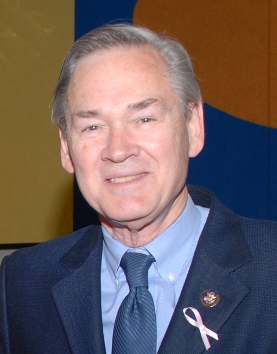
State officials have released statements after hearing of the death of former Congressman Dennis Moore, D-3rd Dist.
Moore, 75, died Nov. 2 in Overland Park, Kansas. He served in office from 1999 through 2011.
A native of Anthony, Kansas, Moore received a bachelor’s degree from the University of Kansas, and a juris doctor degree from Washburn University School of Law. He served as assistant Kansas attorney general, and he also served as Johnson County district attorney from 1977 to 1989.
Gov. Laura Kelly has ordered flags in Kansas to fly at half-staff from sunup Nov. 3 to sundown Nov. 7 in memory of Congressman Moore.
“I was deeply saddened to learn of the death of Congressman Dennis Moore today,” Gov. Kelly said. “Congressman Moore was a fierce and tenacious advocate for children, first as Johnson County District Attorney and then as a Member of Congress. He was instrumental in the establishment of the Amber Alert system, in Kansas and nationwide.
“A veteran himself, Moore is also remembered for his commitment to our Armed Forces. Following the invasions of Iraq and Afghanistan, Moore led the effort to raise death gratuity benefits from $12,000 to $100,000 for the families of fallen service members.
“Beyond his policy contributions, Congressman Moore will be remembered by all who knew him as a kind, pragmatic, common-sense leader who cared deeply about the people he represented. My thoughts are with his wife Stephene, their children and grandchildren,” Gov. Kelly said.
U.S. Rep. Sharice Davids, D-3rd Dist., also released a statement:
“I am very saddened to hear of the passing of Dennis Moore, and my heart goes out to Stephene and his family. Dennis was a dedicated, gracious, and principled leader who will be remembered for his service to the 3rd District and the state of Kansas. To say he left big shoes to fill is an understatement—he leaves a legacy of fighting tirelessly for what is good and right and decent for the people he represented.
“As we mourn his loss, I’m reminded of the first time I met the Moores in person. I brought with me the pocket U.S. Constitution that I had carried with me all through law school—a pocket Constitution with an official label from the Office of Congressman Dennis Moore. After a good laugh about how on Earth I had managed to hold on to it all those years, he offered to sign my copy and gave me advice on my campaign. For his humor, his thoughtfulness, his dedication to public service (and his guitar playing skills): he will be missed.”
U.S. Sen. Jerry Moran, R-Kansas, this afternoon spoke on the U.S. Senate floor in memory of former Congressman Dennis Moore. To see his video, visit https://www.youtube.com/watch?v=_LJFs0k9PZs.
Sen. Moran’s office also issued a statement:
“Congressman Dennis Moore, above all, was a kind man. He was a doting father and grandfather, and I am very saddened to learn of his passing. He served six terms on behalf of Kansans, and in our many years of working together I always had the upmost respect for him and the way he served the people of the 3rd District.
“That respect only grew when I witnessed the way he and his wife, Stephene, faced his battle with Alzheimer’s with a determination to use their experience to help others. One area where we always agreed was the need to invest in finding a cure for Alzheimer’s, and in 2014, Dennis shared his experience with this devastating disease in front of my Senate subcommittee. His legacy will be the way in which he gave others battling Alzheimer’s courage and hope.
“Robba and I extend our heartfelt condolences to Stephene and their family.”
Kansas House Democratic Leader Tom Sawyer issued a statement:
“I am saddened to hear of Congressman Dennis Moore’s passing. His work in local, state, and national politics continues to influence the work we do today. As president of the Blue Dog Coalition in the U.S. House of Representatives, Congressman Moore was at the forefront of change. I’m grateful for his tireless work in Kansas and in Washington. I send my condolences to his family and friends.”
